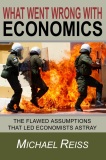Imagine that in the distant past, a ship ran into rocks off a
desert island and started sinking.
Everyone jumped overboard and started swimming towards the nearest
beach. Imagine a guy armed with a gun got to the island first, and then upon
everyone else's arrival, the guy said, “I got here first, so this island is
mine. You can't live here unless you pay me rent for using my land”. The
swimmers have no choice and have to give the “landowner” part of their income
forever more. This situation obviously
stinks. If you were one of the people having to pay rent you would be angry as
hell, you’d protest at every opportunity. Who could possibly defend such
system?
Now imagine that at some later time, a rich islander purchased the
island from the gunman for a large sum of money. The rich man announced to the
rest of the islanders, “That nasty gunman was evil and grabbed the island
unjustly. He had no right to claim rent from you all. But I purchased the land
with my own money and without violence. Therefore this island is rightfully
mine, and now you should all quit protesting and pay me rent!”.
If you were an islander, would you be happy with the
situation now?
By the way, this is essentially the way the world works
today. How do you think the first owners of the land you're living on got to own the land? (Usual answer: they took it by force) Personally, I have no idea why people are not marching in the streets demanding a better system.
Is there a more just way of distributing land? Yes. An idea
known as Georgism. The fact that houses get built on land makes the
potential solutions more complex, but almost any system based on Georgist ideals
would be better than what we have today… unless you’re a landlord that is.



